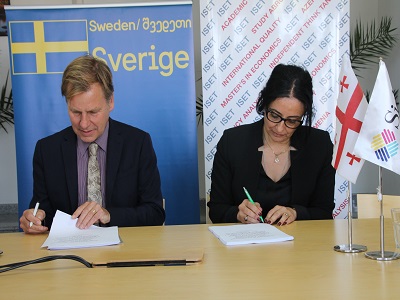ISET Policy Institute receives 12 600 000 SEK from Sweden for promoting Georgia’s development through independent policy analysis, training and civil society engagement. The agreement was signed today by Mr. Erik Illes, Head of Development Cooperation of the Embassy of Sweden, and President of Partnership for Economics Education and Research (PEER), Director of ISET Policy Institute Dr. Tamar Sulukhia. The agreement extends Sweden’s support for development of ISET-PI as independent economics think-tank from October 2019 to December 2021.
The ISET Policy Institute (ISET-PI) is an initiative of the PEER and International School of Economics at Tbilisi State University (ISET). It is a Georgian NGO, created in 2011 as a university-based think tank to complement ISET’s academic arm, translate economic research into policy advice, inform policymaking in both Georgia and the region.
The grant to ISET-PI has been a major source of funding since 2014 for its institutional development. Within the framework of Sweden’s development cooperation strategy in Georgia, provision of support to ISET is part of strengthening Georgia’s democracy, market economy and the country’s economic integration with the EU through enhancing informed policy decision making. The main objective of the institutional grant to ISET-PI was to establish it as the top economic policy think tank with five specialized policy research centers focusing on agricultural economics (APRC), macro-economics (MPRC), private sector development (PSDRC), social development (SPRC), and environmental and energy economics (EEPRC).
The key objectives of the Project extension do not depart from the initial objectives of the project and advance activities in the following direction: increasing the intellectual and financial sustainability of ISET-PI through strengthening its profile and institutional positioning as the country’s leading economic think tank; proactively engaging in providing policy analysis, knowledge and ideas in priority policy areas; improving the strategic communication of ISET-PI for more effective policy impact, greater visibility and enhanced public education; and developing the capacity of key policy parties: the government - for design and implementation of policies, and civil society and businesses - for effective participation in policy formulation and debate.











